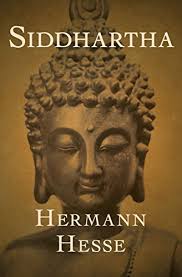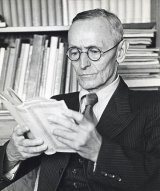Siddhartha Page #8
Siddhartha is a novel by Hermann Hesse that deals with the spiritual journey of self-discovery of a man named Siddhartha during the time of the Gautama Buddha. The book, Hesse's ninth novel, was written in German, in a simple, lyrical style.
"Far is such a thought from my mind," exclaimed Siddhartha. "I wish that they shall all stay with the teachings, that they shall reach their goal! It is not my place to judge another person's life. Only for myself, for myself alone, I must decide, I must chose, I must refuse. Salvation from the self is what we Samanas search for, oh exalted one. If I merely were one of your disciples, oh venerable one, I'd fear that it might happen to me that only seemingly, only deceptively my self would be calm and be redeemed, but that in truth it would live on and grow, for then I had replaced my self with the teachings, my duty to follow you, my love for you, and the community of the monks!" With half of a smile, with an unwavering openness and kindness, Gotama looked into the stranger's eyes and bid him to leave with a hardly noticeable gesture. "You are wise, oh Samana.", the venerable one spoke. "You know how to talk wisely, my friend. Be aware of too much wisdom!" The Buddha turned away, and his glance and half of a smile remained forever etched in Siddhartha's memory. I have never before seen a person glance and smile, sit and walk this way, he thought; truly, I wish to be able to glance and smile, sit and walk this way, too, thus free, thus venerable, thus concealed, thus open, thus child-like and mysterious. Truly, only a person who has succeeded in reaching the innermost part of his self would glance and walk this way. Well so, I also will seek to reach the innermost part of my self. I saw a man, Siddhartha thought, a single man, before whom I would have to lower my glance. I do not want to lower my glance before any other, not before any other. No teachings will entice me any more, since this man's teachings have not enticed me. I am deprived by the Buddha, thought Siddhartha, I am deprived, and even more he has given to me. He has deprived me of my friend, the one who had believed in me and now believes in him, who had been my shadow and is now Gotama's shadow. But he has given me Siddhartha, myself. AWAKENING When Siddhartha left the grove, where the Buddha, the perfected one, stayed behind, where Govinda stayed behind, then he felt that in this grove his past life also stayed behind and parted from him. He pondered about this sensation, which filled him completely, as he was slowly walking along. He pondered deeply, like diving into a deep water he let himself sink down to the ground of the sensation, down to the place where the causes lie, because to identify the causes, so it seemed to him, is the very essence of thinking, and by this alone sensations turn into realizations and are not lost, but become entities and start to emit like rays of light what is inside of them. Slowly walking along, Siddhartha pondered. He realized that he was no youth any more, but had turned into a man. He realized that one thing had left him, as a snake is left by its old skin, that one thing no longer existed in him, which had accompanied him throughout his youth and used to be a part of him: the wish to have teachers and to listen to teachings. He had also left the last teacher who had appeared on his path, even him, the highest and wisest teacher, the most holy one, Buddha, he had left him, had to part with him, was not able to accept his teachings. Slower, he walked along in his thoughts and asked himself: "But what is this, what you have sought to learn from teachings and from teachers, and what they, who have taught you much, were still unable to teach you?" And he found: "It was the self, the purpose and essence of which I sought to learn. It was the self, I wanted to free myself from, which I sought to overcome. But I was not able to overcome it, could only deceive it, could only flee from it, only hide from it. Truly, no thing in this world has kept my thoughts thus busy, as this my very own self, this mystery of me being alive, of me being one and being separated and isolated from all others, of me being Siddhartha! And there is no thing in this world I know less about than about me, about Siddhartha!" Having been pondering while slowly walking along, he now stopped as these thoughts caught hold of him, and right away another thought sprang forth from these, a new thought, which was: "That I know nothing about myself, that Siddhartha has remained thus alien and unknown to me, stems from one cause, a single cause: I was afraid of myself, I was fleeing from myself! I searched Atman, I searched Brahman, I was willing to dissect my self and peel off all of its layers, to find the core of all peels in its unknown interior, the Atman, life, the divine part, the ultimate part. But I have lost myself in the process." Siddhartha opened his eyes and looked around, a smile filled his face and a feeling of awakening from long dreams flowed through him from his head down to his toes. And it was not long before he walked again, walked quickly like a man who knows what he has got to do. "Oh," he thought, taking a deep breath, "now I would not let Siddhartha escape from me again! No longer, I want to begin my thoughts and my life with Atman and with the suffering of the world. I do not want to kill and dissect myself any longer, to find a secret behind the ruins. Neither Yoga-Veda shall teach me any more, nor Atharva-Veda, nor the ascetics, nor any kind of teachings. I want to learn from myself, want to be my student, want to get to know myself, the secret of Siddhartha." He looked around, as if he was seeing the world for the first time. Beautiful was the world, colourful was the world, strange and mysterious was the world! Here was blue, here was yellow, here was green, the sky and the river flowed, the forest and the mountains were rigid, all of it was beautiful, all of it was mysterious and magical, and in its midst was he, Siddhartha, the awakening one, on the path to himself. All of this, all this yellow and blue, river and forest, entered Siddhartha for the first time through the eyes, was no longer a spell of Mara, was no longer the veil of Maya, was no longer a pointless and coincidental diversity of mere appearances, despicable to the deeply thinking Brahman, who scorns diversity, who seeks unity. Blue was blue, river was river, and if also in the blue and the river, in Siddhartha, the singular and divine lived hidden, so it was still that very divinity's way and purpose, to be here yellow, here blue, there sky, there forest, and here Siddhartha. The purpose and the essential properties were not somewhere behind the things, they were in them, in everything. "How deaf and stupid have I been!" he thought, walking swiftly along. "When someone reads a text, wants to discover its meaning, he will not scorn the symbols and letters and call them deceptions, coincidence, and worthless hull, but he will read them, he will study and love them, letter by letter. But I, who wanted to read the book of the world and the book of my own being, I have, for the sake of a meaning I had anticipated before I read, scorned the symbols and letters, I called the visible world a deception, called my eyes and my tongue coincidental and worthless forms without substance. No, this is over, I have awakened, I have indeed awakened and have not been born before this very day."
Translation
Translate and read this book in other languages:
Select another language:
- - Select -
- 简体中文 (Chinese - Simplified)
- 繁體中文 (Chinese - Traditional)
- Español (Spanish)
- Esperanto (Esperanto)
- 日本語 (Japanese)
- Português (Portuguese)
- Deutsch (German)
- العربية (Arabic)
- Français (French)
- Русский (Russian)
- ಕನ್ನಡ (Kannada)
- 한국어 (Korean)
- עברית (Hebrew)
- Gaeilge (Irish)
- Українська (Ukrainian)
- اردو (Urdu)
- Magyar (Hungarian)
- मानक हिन्दी (Hindi)
- Indonesia (Indonesian)
- Italiano (Italian)
- தமிழ் (Tamil)
- Türkçe (Turkish)
- తెలుగు (Telugu)
- ภาษาไทย (Thai)
- Tiếng Việt (Vietnamese)
- Čeština (Czech)
- Polski (Polish)
- Bahasa Indonesia (Indonesian)
- Românește (Romanian)
- Nederlands (Dutch)
- Ελληνικά (Greek)
- Latinum (Latin)
- Svenska (Swedish)
- Dansk (Danish)
- Suomi (Finnish)
- فارسی (Persian)
- ייִדיש (Yiddish)
- հայերեն (Armenian)
- Norsk (Norwegian)
- English (English)
Citation
Use the citation below to add this book to your bibliography:
Style:MLAChicagoAPA
"Siddhartha Books." Literature.com. STANDS4 LLC, 2024. Web. 23 Dec. 2024. <https://www.literature.com/book/siddhartha_24>.




Discuss this Siddhartha book with the community:
Report Comment
We're doing our best to make sure our content is useful, accurate and safe.
If by any chance you spot an inappropriate comment while navigating through our website please use this form to let us know, and we'll take care of it shortly.
Attachment
You need to be logged in to favorite.
Log In